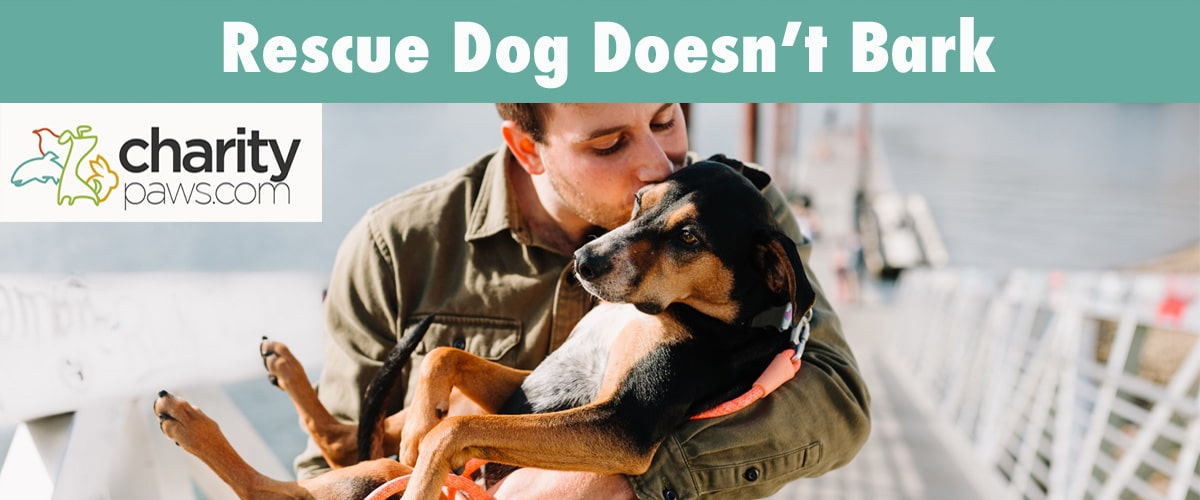When you adopt a new canine friend, there are a few things you typically expect from your pup; one of them being barking.
Many even anticipate their dog’s first bark so you can hear their unique voice, but what if your rescue dog just doesn’t bark?
Are some rescue dogs more quiet than others?
In this article we will discuss some of the most common reasons why your rescue dog has not barked yet, and help you better understand why some furry friends have less to say than others.

Are Some Dogs More Quiet Than Others?
Rescue aside, some dogs are simply more quiet than others.
This can be a result of many potential factors, ranging from previous experience to the dog’s breed.
Some breeds of dog are even known to bark less than other breeds, and this includes:
- Newfoundlands
- Bernese Mountain Dogs
- Basenjis
- Italian Greyhounds
- Shiba Inus
- Shar Peis
The fact that your rescue dog does not bark may have nothing to do with their rescue dog status or their past, but that they may just keep their voice to themselves.
At the end of the day, some dogs are just more quiet than others.
Is It Common For Rescue Dogs To Be Quiet When First Adopted?
It is quite common for a new rescue dog to be reserved in the first few days in their new home.
It is believed to take at least 3 days for a newly adopted dog to no longer be afraid of their new home, so many dogs may not feel comfortable enough to bark during this period.
Think of it as you walking into a room filled with strangers, and how it is a bit more challenging to open up and speak your mind.
This may be how some rescue dogs feel, so it is not uncommon to not hear their beautiful bark for a bit.
Why Doesn’t My Rescue Dog Bark?
Understanding your rescue dog’s perspective is essential when welcoming them into your family.
It’s important to be aware of the many factors behind their behavior.
To help you get to the bottom of your silent rescue dog, let us list the most common reasons why your dog has not barked yet.
They Are A Quiet Breed
As we mentioned above, some breeds of dog are not as vocal as others.
Just as some breeds are known for barking up a storm, others are known for keeping their opinions to themselves.
You can not always be aware of the exact breed of dog that you are adopting, so it is very possible that they are simply a mixture of quiet pups.
They Are Still Adjusting To Their New Home
A newly adopted rescue dog will need some time to feel comfortable in their new home.
They may keep to themselves as they explore their new surroundings, and this may include keeping their voice to themselves as well.
If it seems like your rescue dog is still a bit nervous in their new environment, their silence could just be a result of this.
If this is the case, you should begin to hear more from your dog once they get settled.
It Is Just Their Personality
Do you have any friends in your life that are known for being a bit more quiet and reserved?
This can be normal for some people’s personality, and this applies to our furry friends as well.
Not all dogs feel the need to bark and alert their owners throughout the day, and some simply save their voice for the important canine notifications.
If your pup still does not bark often even after they have adjusted to their new home, this may just be normal for them.
Also Read: How To Help A Timid Rescue Dog
They Had A Traumatic Past
Unfortunately, many rescue dogs come from a traumatic past.
Some dogs were subjected to abuse when they would participate in normal canine behaviors such as barking, causing them to associate their barking with painful memories.
Your rescue dog may be fearful of barking because of this, and it may take some time for them to find their voice again.
While hopefully they will soon realize that they are finally safe, some may be quiet for the rest of their lives because of it.
They Don’t Feel Well
If your rescue pup is feeling under the weather for any reason, they may not bark as much as they would if they were healthy.
Barking can take up quite a bit of energy, and a sick dog may not have the desire to speak because of it.
If you think your rescue dog may not be feeling well, we always suggest reaching out to your vet or the rescue you just adopted them from.
Be sure to be on the lookout for any signs of illness such as:
- Coughing
- Sneezing
- Vomiting
- Diarrhea
- Lethargy
- Lack of appetite
When Should I Be Worried That My Dog Doesn’t Bark?
In most situations, you should not worry at all if your rescue dog doesn’t bark often.
This is typically a result of adjusting to their new home or being a quiet dog, and it usually does not point to any underlying medical conditions.
However, there are a few signs of potential complications that you should be on the lookout for.
As we mentioned above, some dogs will not bark when they are feeling sick.
Dogs can be exposed to infectious illness in a rescue or shelter setting, so you will always want to monitor your rescue dog closely in the weeks following their adoption.
If your quiet pup begins to display any abnormal symptoms, then we always suggest reaching out to your vet for guidance.
Another factor that you should be on the lookout for is a dog that tries to bark, but is unable to make a significant amount of noise.
This can be evidence of an underlying issue that impacts the trachea or the lungs, so it is best to have them assessed by a veterinarian if you see this.
My Rescue Dog Has Never Barked, Will They Someday?
Hearing your new dog’s bark for the first time is special, so many dog owners will be anxiously awaiting this moment.
Some may begin to wonder if their rescue dog will ever bark if some time passes without a single peep, but it is difficult to predict in most pups.
In most cases, you will eventually hear your dog bark once they have settled in and something has caught their interest.
It may be a rare occurrence for some dogs, but this simply means you need to treasure each bark they voice.
Final Thoughts On A Rescue Dog That Won’t Bark

We know how excited you are to hear your rescue dog’s first bark, but it may take some time for them to settle and feel comfortable around their new family.
Just because your new pup isn’t barking, does not mean something wrong is going on.
Give your new rescue some time to adjust and get to know their new family.
Before you know it, you will be well acquainted with their unique voice.


We rescued an abused fearful young large dog . In the first week it barked constantly when she saw us. Slowly by the second week she was eating and drinking regularly and seldomly barks at all.
We bought a caged dog from a discussing puppy mill. Our dog weighed 17 lbs at 4 months and was in a small glass box with a husky puppy. Neither dog looked at the other with the aussie facing away in a corner. We were so concerned although we were clueless about the breed, we had to take her home. This dog did not bark for a full month. Now you can’t stop her from alerting us.